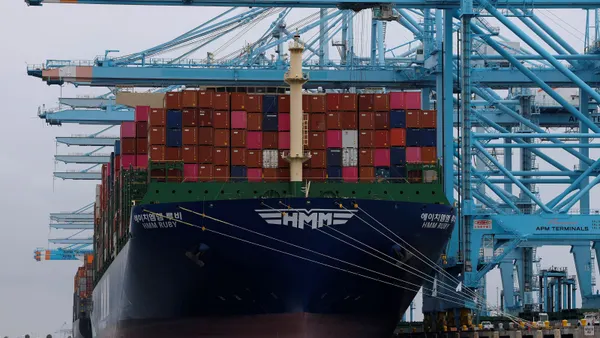Dive Brief:
- With new investments from Hapag-Lloyd and CMA CGM, the New York Shipping Exchange (NYSHEX) announced Monday it raised $13 million during its Series A investment round. GE Ventures and Goldman Sachs also added to their previous investments.
- The contract service provided by NYSHEX is a means for both shippers and carriers to adhere to reserved space agreements on board cargo vessels. The cargo shipping industry currently struggles with unfilled reservations on the side of shippers and unplanned cancellations on the side of carriers.
- Hapag-Lloyd and CMA CGM join Mitsui O.S.K. Lines and Orient Overseas Container Lines as carrier participants in the contracting platform.
Dive Insight:
Operations like NYSHEX and others seek to resolve the longstanding struggle between shippers and carriers by creating contract- or blockchain-based fee systems, enforcing an "honor or pay" program.
No-shows or rollovers are generally caused by varying freight rates since when a lower price can be found on another line, shippers are apt to choose savings over reservations. Shippers may take advantage of flexible cancellation policies to book redundant slots among competing carriers and ensure their cargo is transported at the lowest cost. However, this unpredictability often causes carriers to oversell as they seek a full load, which is necessary to preserve their low rates.
At present, a host of startups is attempting to address this issue. NYSHEX, which is fashioned after practices followed at the New York Stock Exchange, Chicago Mercantile Exchange, and the London Metals Exchange is but one. 300cubits, another startup seeking to resolve the shipper/carrier conflict, relies on blockchain technology. Using a public Ethereum platform, 300cubits "tokenizes" reservations online, with each transaction becoming a TEU (the ironic name of the token currency). The tokens ultimately act like cash, creating accountability for each reservation, according to the startup.
The key word for both endeavors is startup. While neither has been in practice long enough to prove successful, the fact that an effort is being made to resolve the costly and wasteful practice of overbooking and rollovers is a good sign for the industry. If full recovery is to be successful, a method of trust must be established.












